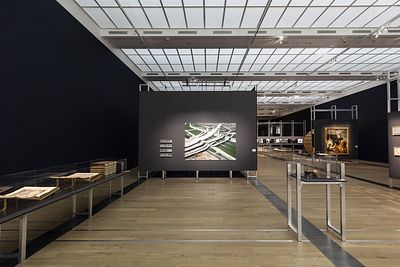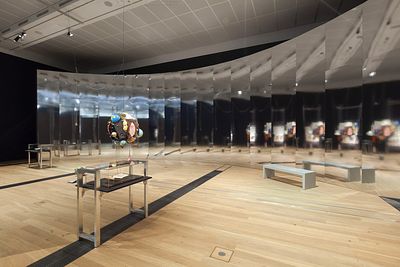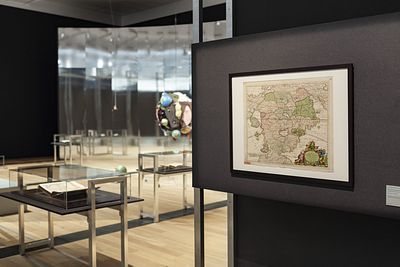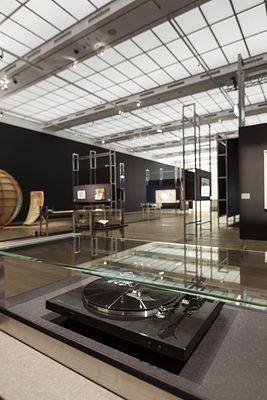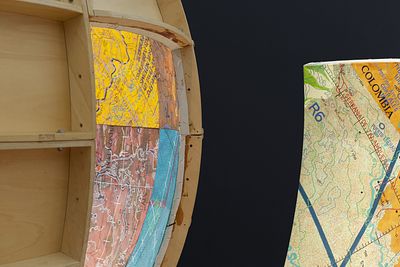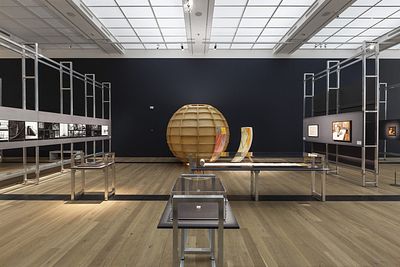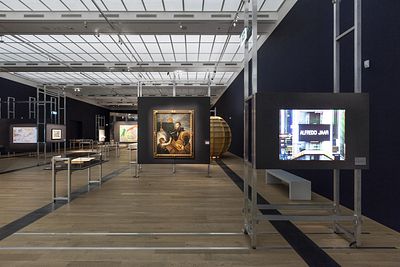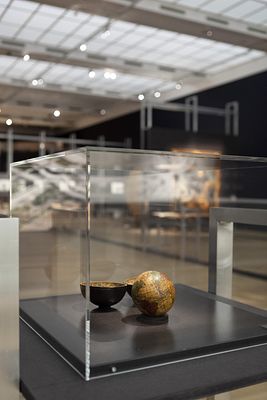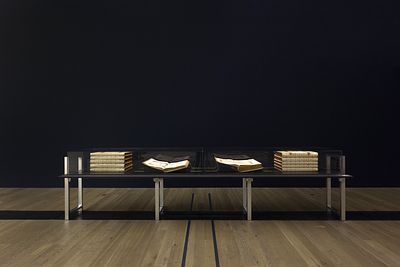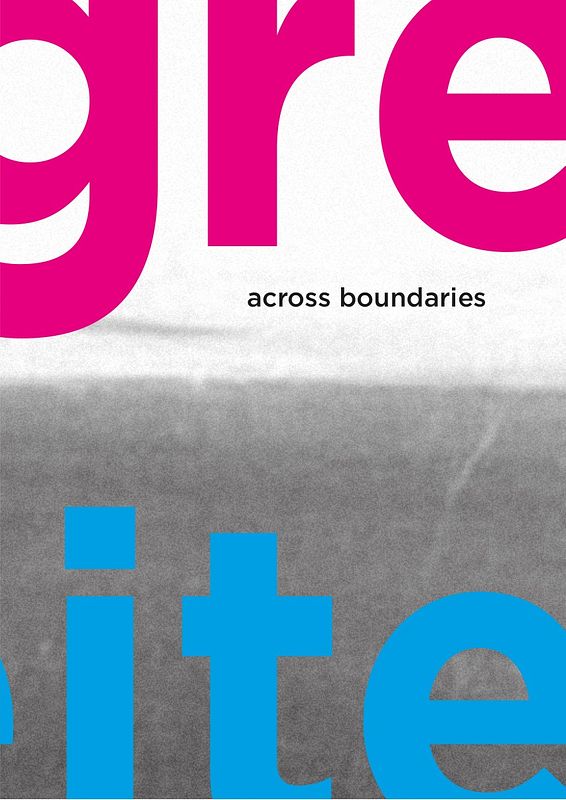MAIN SPACE | 14.10.2018 – 27.01.2019
ACROSS BOUNDARIES
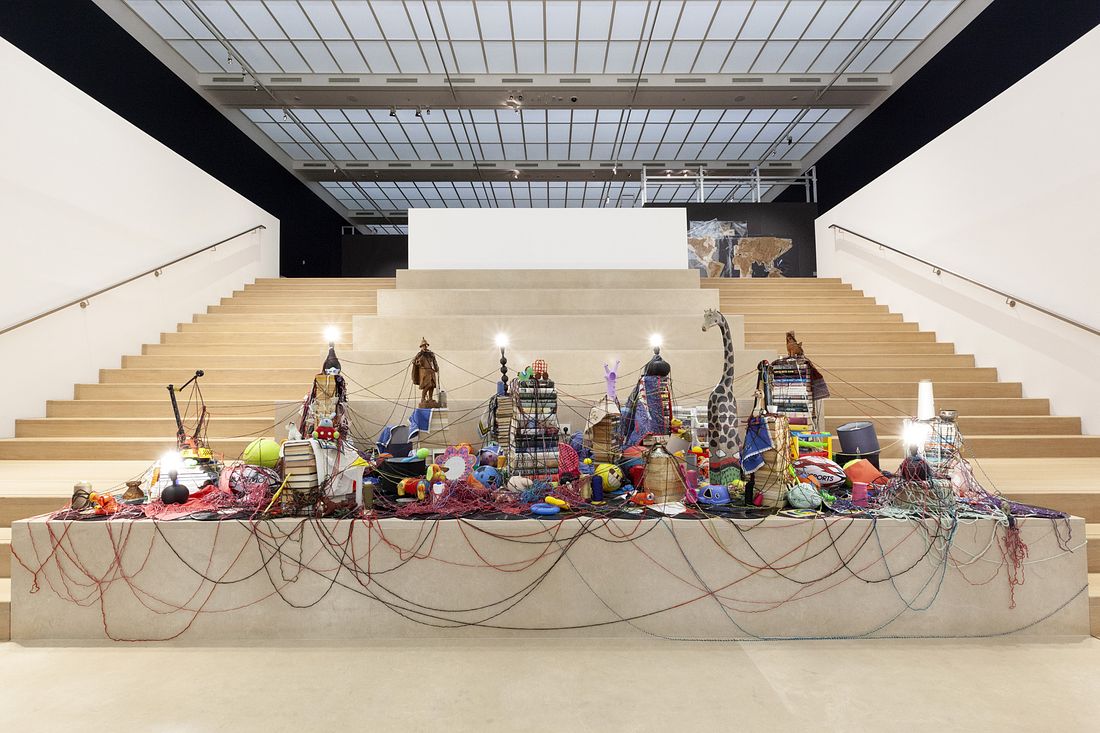
The need to situate oneself spatially and mentally in the world is deeply anchored in people. Maps shape how we perceive the world and what points of orientation we choose in a decisive way. As a medium of presentation and communication they convey existing and aspired to world orders and actively contribute to shaping them. With the exhibition 'across boundaries', the Draiflessen Collection is dedicating itself to the qualities of maps as surfaces for projecting the world. The exhibition puts maps from various epochs in relation to artworks by international artists that examine the cartographic depiction of space or the influence of maps on our view of the world.
The aim of the exhibition is to raise awareness of the suggestive power of maps and to open up new perspectives on the world and existing orders. Especially at the present time, when globalism and territorial demarcation have entered into a dynamic relationship, juxtaposing maps and artworks can make us aware of the origin and power of 'views of the world', but also of how they can change.
Starting from the characteristics of maps, the exhibition is structured in three closely interlinked areas: 'Knowledge', 'Imagination', and 'Power':
The area 'Knowledge' light on the possibilities and limitations of maps as a medium for understanding the world. Maps are often comprehended as true-to-life images of reality based on objectively compiled data. Artistic positions deconstruct or overcome handed-down and contemporary means of representation as well as how cartography is interpreted. They show that maps are always constructions of reality that depict the state of knowledge and perspectives of the respective mapmaker and are always based on a selection of information.
The area 'Imagination' is dedicated to maps as a space for the imagination and a creative instrument: By means of maps, alternative concepts of reality can be transported or entirely new, fictitious worlds can be created. For scientists and artists, the medium of maps offers the opportunity to give shape to their ideas and utopias and, transcending familiar borders, to break with existing traditions and ways of thinking – and hence shape the image of the world anew.
The aim of the exhibition is to raise awareness of the suggestive power of maps and to open up new perspectives on the world and existing orders. Especially at the present time, when globalism and territorial demarcation have entered into a dynamic relationship, juxtaposing maps and artworks can make us aware of the origin and power of 'views of the world', but also of how they can change.
Starting from the characteristics of maps, the exhibition is structured in three closely interlinked areas: 'Knowledge', 'Imagination', and 'Power':
The area 'Knowledge' light on the possibilities and limitations of maps as a medium for understanding the world. Maps are often comprehended as true-to-life images of reality based on objectively compiled data. Artistic positions deconstruct or overcome handed-down and contemporary means of representation as well as how cartography is interpreted. They show that maps are always constructions of reality that depict the state of knowledge and perspectives of the respective mapmaker and are always based on a selection of information.
The area 'Imagination' is dedicated to maps as a space for the imagination and a creative instrument: By means of maps, alternative concepts of reality can be transported or entirely new, fictitious worlds can be created. For scientists and artists, the medium of maps offers the opportunity to give shape to their ideas and utopias and, transcending familiar borders, to break with existing traditions and ways of thinking – and hence shape the image of the world anew.
The area 'Power' focuses on the creation and legitimisation of orders and balances of power by means of maps. With the visualisation of size ratios and relationships, power structures and spheres of influence are defined and secured and identities and allegiances are shaped on a conceptual and institutional level. Maps already found symbolic expression as an instrument of power early on in visual art. Artistic works by younger artists raise our awareness of the significant influence of the medium on people’s thinking and actions.
A richly illustrated catalogue in German, English, and Dutch editions will be published accompanying the exhibition.
The exhibition is to be accompanied by an extensive supporting programme.
A richly illustrated catalogue in German, English, and Dutch editions will be published accompanying the exhibition.
The exhibition is to be accompanied by an extensive supporting programme.
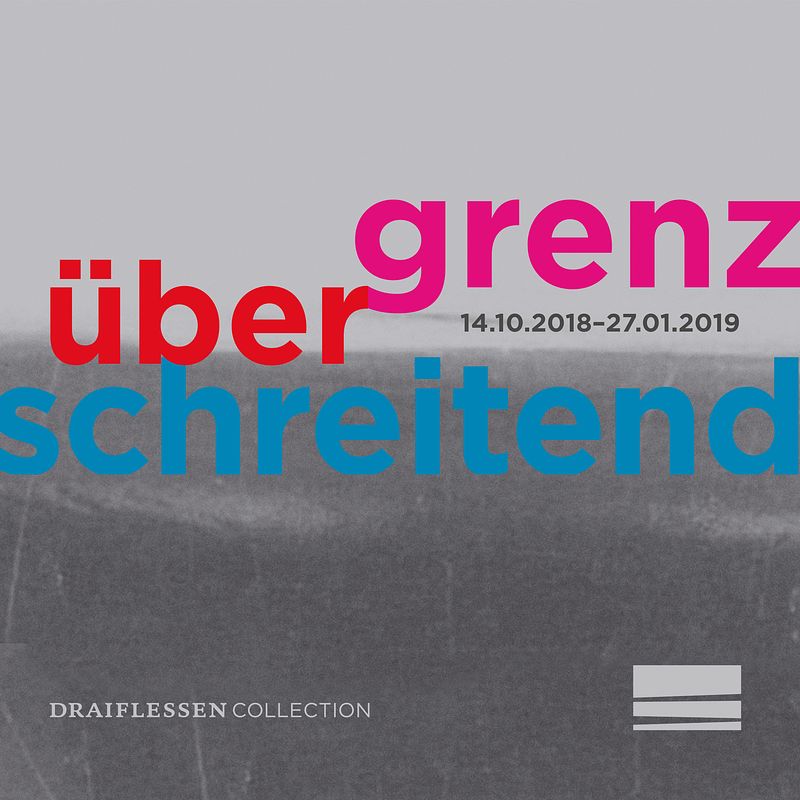
across boundaries
| © Draiflessen Collection
Video
Nicole Roth, one of the curators of 'across boundaries' was interviewed by Oliver Langemeier, IVZ.
(ivz-aktuell.de, 12 October 2018, report: Oliver Langemeyer, André Elshoff ©ivz.medien GmbH & Co. KG, all rights reserved)
(ivz-aktuell.de, 12 October 2018, report: Oliver Langemeyer, André Elshoff ©ivz.medien GmbH & Co. KG, all rights reserved)
Artists and Cartographs
Eduardo Abaroa (*1968 Mexico City/MEX, lives in Mexico City/MEX), Michael Aitsinger (Obereitzing/AUS ca. 1530–1598 Bonn/D), Arianna Arcara (*1984 Monza/IT; lives in Pianello Val Tidone/IT), Katja Aufleger (* 1983 Oldenburg/D, lives in Berlin/D), Pauline Baynes (Brighton/GB 1922–2008 Surrey/GB), Berger&Berger (Laurent P. Berger (*1972, lives in Paris/F) & Cyrille Berger (*1975, lives in Paris/F)), Joan Blaeu (Alkmaar/NL 1596–1673 Amsterdam/NL), James Bridle (* 1980/GB, lives in London/GB), Tiffany Chung (* 1969 Đà Nẵng/VNM, lives in Ho Chi Minh/VNM), Johann Gabriel Doppelmayr (Nürnberg/D 1677–1750 Nürnberg/D), Joaquín Torres García (Montevideo/URY 1874–1949 Modevideo/URY), James Gillray (Chelsea/GB 1757– 1815 London/GB), Aaron Hobson (* Rochester, NY/USA, lives in New York/USA), Ambrosius Holbein (Augsburg/D ca. 1494–after 1519 Basel/CH), Henry Holiday (London/GB 1839–1927 London/GB), Johann Baptist Homann (Oberkammlach/D 1664 –1724 Nuremberg/D), Stephan Huber (* 1952 Lindenberg, Allgäu/D, lives in Munich/D), Alfredo Jaar (*1956 Santiago de Chile/CHL, lives in New York, NY/USA), Joyce Kozloff (* 1942 Somerville, NJ/USA), Jenny Michel (* 1975 Worms/D, lives in Berlin/D), Moshekwa Langa (* 1975 Bakenberg/ZAF, lives in Amsterdam a.o. /NL), Rivane Neuenschwander (* 1967 Belo Horizonte/BRA, lives in São Paolo/BRA), Hajime Narukawa (*1971 Kawasaki/JPN; lives in Tokyo/JPN), Felix Nussbaum (Osnabrück/D 1904–1944 KZ Auschwitz-Birkenau/PL), Abraham Ortelius (Antwerpen/BEL 1527–1598 Antwerpen/BEL), Johann Georg Puschner (Nürnberg/D 1680–1749 Nürnberg/D), Philippe Ramette (* 1961 Auxerre/F, lives in Paris/F), Daniel Richter (* 1962 Eutin/DE; lives in Berlin/DE), Peter Paul Rubens (Siegen/D 1577–1640 Antwerp/NL), Saul Steinberg (Râmnicu Sărat/ROU 1914–1999 New York, NY/USA), Susan Stockwell (* 1962 Manchester/GB, lives in London/GB), David Teniers The Younger (Antwerp/BE 1610–1690 Brussels/BE), The Nest Collective (artist collective in Nairobi/KEN), John Ronald Reuel Tolkien (Bloemfontein/ZAF 1892–1973 Bournemouth/GB), Clement Valla (* 1971/USA, lives in New York, NY/USA), Ruth Watson (* 1962/NZL, lives in Auckland/NZL), Joe Webb (* 1976 London/GB, lives in Brighton/GB)
Visitors' Comments
Eine wundervolle Ausstellung. Wer hätte gedacht, dass Mettingen so cool ist.
Ein erstaunliches Haus, eine durchdachte Ausstellung und eine gelungene Eröffnung. Vielen Dank!
Was für eine faszinierende Idee für eine Ausstellung und was für eine gelungene Umsetzung! Danke für die vielen Denkimpulse, die ich mit nach Hause nehmen kann. Wo ist oben, wo ist unten ... da, wo es mir gefällt!
Tolle Ausstellung, gutes Thema und die Führung war super.
